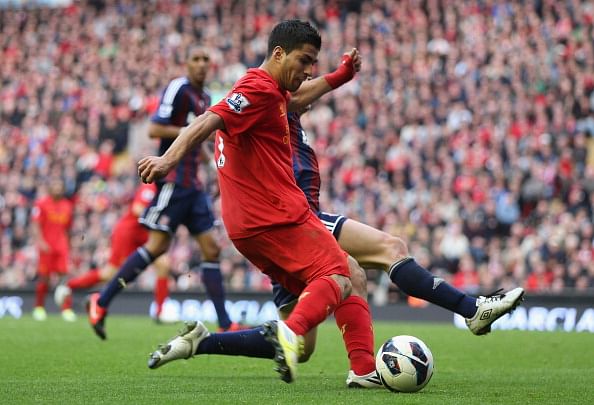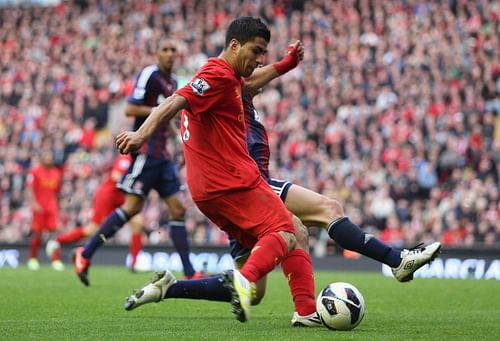
Diving: Not just an Olympic sport

LIVERPOOL, ENGLAND – OCTOBER 07: Luis Suarez of Liverpool shoots during the Barclays Premier League match between Liverpool and Stoke City at Anfield.
I didn’t think it would be worth getting involved in the diving debate (or as involved as a casual blogger can get anyway). It’s a debate that pops up every few months. A foreign player dives and all hell breaks loose. Arsene didn’t see it, Rogers blames the referees, and Pulis is incensed.
Recently, when Michael Owen came out and blamed diving on the influx of foreign players into the British leagues since the 1990′s, it got me thinking about the problem again.
Diving is now part of the game. Yes, it is unfortunate, but it is the case. Of course, the majority of football fans are all for punishment of players caught blatantly trying to trick the referee into giving incorrect decisions. Overlooking the obvious practical problems of implementing it, I would even be in favour of some kind of post-match review of every game, where there have been suspicions or allegations of diving, with appropriate punishments meted out to those who deserve them.
However, I would argue that if we are going to successfully clamp down on diving, it needs to be done properly. It cannot solely be a FA proposal. What would happen if diving was stamped out of English football, only for our teams to go to play in European or international competitions and face the same problem? How would our referees manage when officiating International or European fixtures when for them, diving has become an offence worthy of the harshest punishment? For this to work, FIFA would need to be on board. Not to sound too cynical, but personally I don’t think FIFA would be too forthcoming on the issue. If they can’t decide on goal line technology or even stamp out outrageous corruption within the highest levels of the organisation, they are unlikely to spearhead a global anti-diving campaign.
How different is diving from more traditional, less ‘continental’ forms of cheating anyway? Shirt-pulling, hands on your opposition’s shoulders when challenging for headers, and even some casual off-the-ball violence – see John Terry’s hilariously misguided assault on Alexis Sanchez in last year’s Champions League semi-final. In all of these incidents, players are attempting to get an unfair advantage by breaking the rules, and then trying to conceal their actions from the officials. Diving might seem like a sneakier, less honourable way of cheating, but it is just one of many widely employed methods for opponents trying to get an advantage over each other.
Growing up in the early 1990′s, I have only ever known the Sky-era of football. The big money transfers, the Monday Night Football, that night in Barcelona, weekday Champions League clashes; all of them have been made possible by the globalisation and monetisation of football. I remember Eric Cantona karate kicking a fan, Thierry Henry swaggering around Highbury, Patrick Viera driving on the ‘Invincibles’, and Cristiano Ronaldo relentlessly breaking various English records. What would our league, the one that so many people love to call ‘the best in the world’, be without such players and such foreign influence? There has been an English team in the final of the Champions League in seven of the past eight years, including three winning teams. Nobody would deny that foreign players and their different styles of football have been central to these successes. Maybe an increase in diving in the domestic leagues is an acceptable trade-off for such successes.
Furthermore, it is unfair to focus on foreign influence as the problem. Though diving may have been brought over on the boats from the European mainland, British players have happily embraced it. It is not rare to see players capped for the home nations going to ground with the slightest encouragement. Think of Ashley Young, Steven Gerrard, and Gareth Bale, just to mention a few of the more well-known offenders in recent times. It is easy to point the finger at foreigners for bringing diving into our flawless and honourable league, but we must admit that it has now become a problem that is not limited to them alone. I understand the argument that this has occurred in an effort to level the playing field. “If they dive and win penalties then we have to as well”. That, for me, is the easy way out. Players like Steven Gerrard, who have several times come out strongly in the media against diving, still do it at all levels. I think the English authorities and players need to accept some of the responsibility for the problem that we have now.
I’m not at all condoning diving. None of us like it. I would like to see any divers given straight red cards and bans. But let’s be honest, it isn’t destroying the game. It’s an annoyance that we have to, and can, put up with, considering all that the globalisation of English football has given us. We have far more important issues to worry about before we look at diving: racism, sexism, hooliganism, doping, and not least, the dodgy financial dealings of many clubs and individuals alike. If previous patterns are to be followed, the outrage will subside within the next couple of weeks, and will lay dormant until the next time Luis Suarez steps on another imaginary land mine.